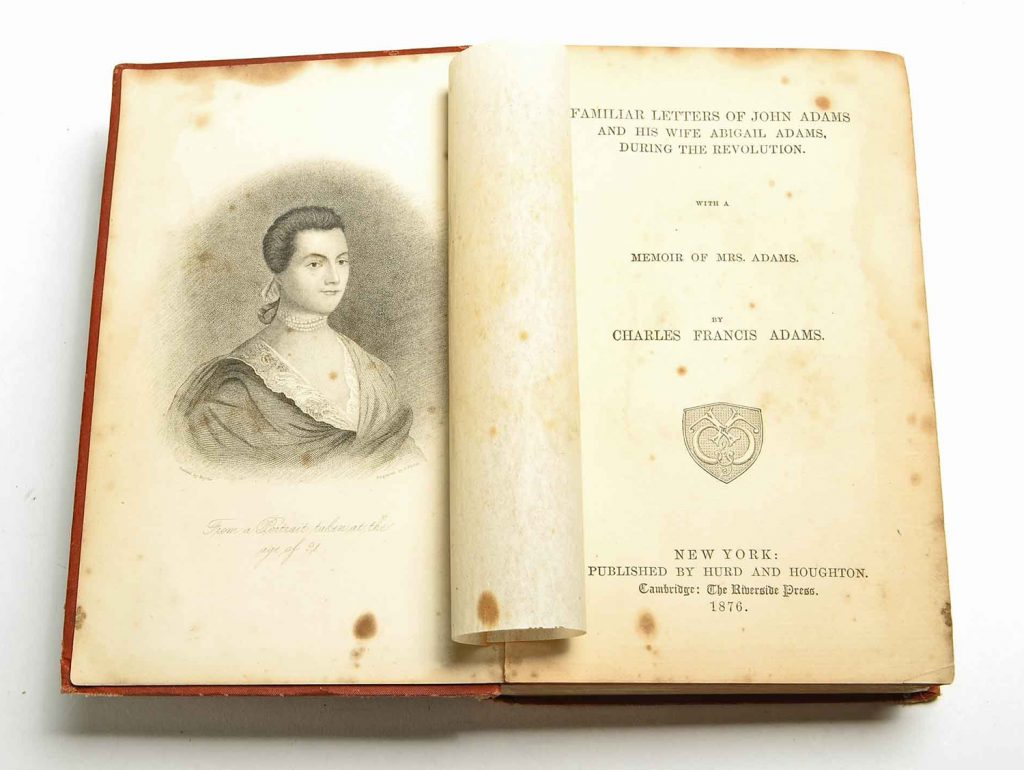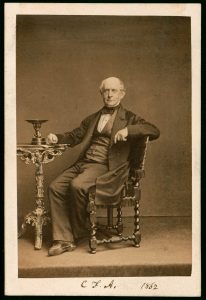by Sara Georgini, The Adams Papers
When did you first hear the letters of John and Abigail Adams? Fashionable Bostonians could pin their first memory to an exact spot. Shortly after lunchtime on a January afternoon in 1838, two hundred curious guests swarmed into the Masonic Grand Lodge downtown. Braving the cold, they came to hear Charles Francis Adams (1807–1886), son and grandson of presidents, tell all about his famous family. He felt ready, even eager, to air a few memories. A month earlier, Charles had begun work on his lecture at the special request of the Massachusetts Historical Society, which hosted a series of talks around town. A studious researcher and a curator of the family archive, Charles wanted to share Abigail’s life story with a larger audience. He asked his father, John Quincy, for permission to narrate the private manuscripts in public. “My intention would be to use such of my grandmother’s letters most especially as would illustrate the female character of the age of the Revolution,” Charles wrote. “Of course, the selection must depend upon my discretion and there would be no publication.” When the query reached him, the senior Adams had retrenched in public service. He sent a hasty reply: “Use all the papers at your pleasure.” Charles dove into the project. Here is how her grandson chose to remember Abigail.

Charles was a systematic reader. Back at the family farm in Quincy, the papers overflowed with love letters and state secrets. He plodded through the stacks, more or less chronologically. In constructing a narrative for his lecture, Charles stuck to the basic timeline of the Revolution. His first pick was an 8 Sept. 1774 letter from John to Abigail. The Massachusetts delegate wrote hurriedly from the Continental Congress: “It would fill Volumes, to give you an Idea of the scenes I behold and the Characters I converse with. We have so much Business, so much Ceremony, so much Company, so many Visits to recive and return, that I have not Time to write. And the Times are such, as render it imprudent to write freely.” In his lecture draft, Charles summarized what happened next in that chain of correspondence: how John Adams compared the Anglo-American politics of the day to those of Julius Caesar; how the Harvard-trained lawyer quoted Shakespeare’s lines on the “shallows” of bravery; how John often addressed Abigail as “Portia.” Charles stressed that John cherished his wife as a confidante and adviser.
Enter Abigail. Two decades after her death, the second First Lady commanded Boston’s biggest stage and reclaimed the nation’s imagination. The first Abigail letter that Charles read was sent to John, dated 24 May 1775, heralding the drumbeat of war. “I wish you was nearer to us. We know not what a day will bring forth, nor what distress one hour may throw us into,” Abigail wrote. “Heitherto I have been able to mantain a calmness and presence of Mind, and hope I shall, let the Exigency of the time be what they will.” Carefully, Charles reconstructed Abigail Adams as an emblem of republic motherhood, a woman who raised her children to guard and grow the nation. In his selection of manuscripts and public remarks, Charles sharply reoriented the Adams family’s political brand around Abigail’s legacy. Appealing to early Victorian views on Christian nurture, he emphasized that women’s domestic influence fueled the American Revolution. Like “light to the diamond,” moral virtue gave to the “political character of a nation all its lustre and its value,” Charles wrote. Women like his grandmother were blessed and burdened to provide it.

Abigail Adams’s nature fascinated Charles, and he shared that awe with his audience for at least two hours. He wondered aloud: How did she balance private emotion and public duty? And what might studying other women’s lives reveal to Americans about the “revolutionary spirit”? He did not include her eloquent plea to “Remember the Ladies,” but he certainly kept her message intact. Thanks to Abigail’s canon, Charles glimpsed a new field for citizens and scholars to explore. “All of the leading actors in the revolutionary drama had mothers or wives or intimate friends with whom they indulged in the expression of their genuine, unadulterated feelings,” Charles said. “And yet when we take a glance over what is now known to exist upon record of them, where do we find anything even tolerably satisfactory to reward our search?” At the first public reading of the Adams Papers, Charles Francis Adams neatly laid out many of the editorial challenges and opportunities that we face today as an editorial project. And his initial encounter with family history encouraged him, as an editor, to learn how to think between the documents. Sometimes his opinions and ideas manifested on the page, when he silently omitted or even “corrected” his grandparents’ words. Yet Charles was the first to impose meaningful order on the archive. He also took on the task of building a presidential library on Peacefield’s leafy grounds.
Did the crowd of 1838 lean forward a little bit more as they listened in on Abigail and John? Charles repeated his lecture to several keen audiences, relieved that his “experiment” was a hit. Heartened by his hard-won popularity as a man of letters, he began compiling a popular edition of Abigail’s correspondence. With a few tweaks, he repurposed his Massachusetts Historical Society talk for use in the introductory memoir. He reminded readers that Abigail’s letters offered a backstage pass to revolutionary drama, and that Americans would benefit from her story. For Charles, remembering Abigail held “double charms…painted by the hand of truth.”


Thank you Sara, for your eloquent review of Charles’s talks, and book.